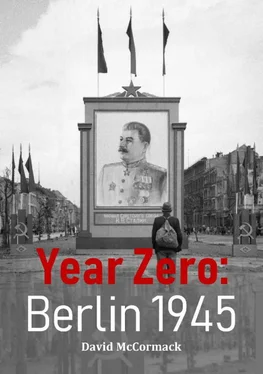Stella’s marriage was a sham, and as such it was doomed to failure. She soon became exasperated with a husband whom she regarded as a sexual fake. The thrill of the chase was also losing its appeal as there were fewer and fewer Jews left to hunt down. Increasingly she sought comfort in the company of other men. Stella became depressed, demotivated, and increasingly needy. Above all, she craved a man who could provide her with what she really needed, ‘Emotional anchorage, sex, and protection from worldly danger’.
By late 1944, Stella had managed to convince her Gestapo handlers that she was too well known to operate as a ‘catcher’. She continued to work as a ‘scout’, checking out addresses to see if Jews were still living there. She carried out the work with little enthusiasm, and her reports that there were no more Jews to be found went unchallenged by her superiors. At around this time, she had also met a new lover, an older man known as Heino Meissl. The two embarked upon a passionate affair. In February 1945, Stella discovered that she was pregnant. She thought that a child would bind her lover closer to her. The Red Army was closing in, and she needed the protection of her knight in shining armour. It turned out that Heino wasn’t the gallant protector that she imagined him to be. No sooner had she announced the pregnancy, than her knight errant made plans for his own escape from Berlin. He had a future, as a Nazi-collaborator she had none. ‘She only wanted me for an alibi’, he later recalled.
Stella gave birth to a baby girl in October 1945. Heino never returned to protect her from the vengeance of Berlin’s surviving Jews. Indeed, 1945 was to be Stella’s own ‘year zero’ as her past finally caught up with her. Since beginning her career as a Gestapo ‘catcher’ in August 1943, she had been responsible for hunting down anything up to 3000 Jews, most unknown to her, but many others had been friends and acquaintances. Her inevitable arrest by the Soviet authorities in Liebenwalde came after she was overheard saying that, ‘The GPU (Soviet Secret Police) is worse than the Gestapo’. Her baby was taken away by the woman who had denounced her to the authorities. Stella was then taken to the Alexanderplatz prison in Berlin to be interrogated. Her subsequent trial was a blur, conducted entirely in Russian. Following the guilty verdict, she was sentenced to ten years hard labour.
During the first two years of her sentence, Stella toiled in Soviet Special Camp No. 7 (formerly Sachsenhausen Concentration Camp). She served her remaining years at Torgau, Hoheneck Fortress, and finally at Waldheim Hospital (where she was recovering from TB). Following her release, ‘The Blonde Poison’ stated that she considered herself a victim of the Jews. In later years, she converted to Christianity and became an open and vocal anti-Semite. Her story is intriguing and disturbing. It is also one which raises important moral questions, chief amongst them must be: Just how far will a person go to survive?
Chapter Six
Intrigues and Deceptions
On 28 March 1945, General Dwight D. Eisenhower wrote a personal message to Stalin. He considered the matters contained in the message of such significance that he bypassed the Chiefs of Staff, leaving the Allied military missions in Moscow to inform Stalin directly of his intentions. The message was indeed significant in that it represented nothing less than a complete volte-face concerning his former strategic outlook which had placed Berlin at the centre of Allied planning. The previous day, Eisenhower had spoken to the press, for the first time openly conceding that Stalin would win the race for Berlin by stating that, ‘I think mileage alone ought to make them do it. After all they are thirty-three miles away. They have a shorter race to run’. Field Marshal Bernard L. Montgomery was disappointed by Eisenhower’s statement. However, Eisenhower was quite correct in his thinking as he was fully aware of the extent to which the strategic picture had changed following the rapid advances of the Red Army from the Vistula to the Oder.
Eisenhower’s strategic outlook was to a large degree influenced by General Omar Bradley, who pointed out the practical difficulties of advancing from the Elbe. Furthermore, it was the centrally placed American 12 thArmy Group that was best placed to effect a link up with the Red Army in the Dresden area. In the process they would split the German forces and sever land communications between Berlin and the anticipated site of a last stand in the mountains of Bavaria. To this end, Eisenhower took the 9 thArmy from Montgomery’s 21 stArmy Group in order to reinforce Bradley’s southern thrust. Later, he justified his decision stating that, ‘I could see no political advantage accruing from the capture of Berlin that would offset the need for the quick destruction of the German army on our front’. Notwithstanding, the British response was both swift and condemnatory. On 29 March, Churchill’s main military advisor Field Marshal Viscount Alanbrooke wrote in his diary:
To start with, he has no business to address Stalin direct, his communications should be through the Combined Chiefs of Staff; secondly he produced a telegram which was unintelligible; and finally, what was implied in it appeared to be entirely adrift and a change from all that had been previously agreed on.
Two days later, Churchill penned a private memorandum to the British Chiefs of Staff which read:
It seems to me that the chief criticism of the new Eisenhower plan is that it shifts the axis of the main advance upon Berlin to the direction through Leipzig to Dresden, and thus raises the question of whether the 21 stArmy Group will not be so stretched as to lose its offensive power, especially after it has been deprived of the 9 thUnited States Army. Thus we might be condemned to an almost static role in the north and virtually prevented from crossing the Elbe until an altogether different stage in the operations has been reached. All prospect also of the British entering Berlin with the Americans is ruled out.
Churchill was aggrieved, but felt powerless to act against an ally whose massive economic might meant that it was inevitable that they would dominate the conduct of the war. To this end, he warned the British Chiefs of Staff that their American counterparts would ‘riposte heavily’ to any criticisms of Eisenhower’s decision. Nonetheless, the British Chiefs sent a lengthy telegram protesting that Eisenhower had exceeded his authority.
The breach within the Allied command structure prompted the American Chief of Staff General George Marshall to pass on the British complaints to Eisenhower for his further consideration. Having received Marshall’s telegram, Eisenhower contacted the American military representative in Moscow, General John R. Deane to enquire if it was not too late to delay sending the message concerning his strategic intentions to Stalin. Much to his relief, Deane confirmed that the message had not yet been sent. In the meantime, the anticipated riposte by the American Chiefs arrived in the form of a combative message supporting Eisenhower’s new strategy. The tone of the message was such that there could be no doubt about the future direction of strategy. It stated that:
…Eisenhower is the best judge of the measures which offer the earliest prospect of destroying the German armies or their power to resist… His strategic concept is sound from the overall viewpoint of crushing Germany as expeditiously as possible and should receive full support.
With the support of General Marshall and the American Chiefs, Eisenhower presented Churchill, Montgomery and the British Chiefs with a fait accompli. Neither British, nor American forces would be going to Berlin.
Читать дальше












